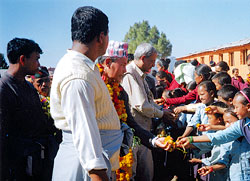|
|
| LET THERE BE LIGHT: Ambassador Shiv Shankar Mukharjee at the inauguration ceremony of a solar electrification project in Katunje, Dhading. Over 2000 people will directly benefit from the electricity generated by this Rs 10 million project. |
When we speak of 'foreign aid' or 'donors', Indian development assistance to Nepal rarely comes up even though the southern neighbour is one the largest contributors.
In fact it was with Indian assistance that Nepal built its first highways, large hydropower plants and airports in the mid-1950s.
Such mega-projects continued until recently with support for Nepal's east-west fibre-optic backbone, a project to build feeder roads across the tarai and upgrade customs and immigration checkpoints along the common border.
But there has been a shift since 2003 from large infrastructure projects to small grants to grassroot communities. In the past three years the Indian Embassy in Kathmandu has helped 58 rural schools in 35 districts, 1,000 drinking water projects, and 10 solar electrification projects.
Of Rs 22.4 billion overall Indian economic cooperation to Nepal at present, Rs 700 million goes to small projects. And while other donors have frozen or suspended their aid since February First, Indian aid has not been cut.
"We continue to help Nepal because of a very simple and firm commitment, a peaceful and prosperous Nepal is good for India," explains Indian ambassador Shiv Shankar Mukharjee.
But why the shift to small grants? Explains Kheya Bhattacharya, minister in the Economic Cooperation Wing at the Indian Embassy: "We felt the need to be more people-centred in Nepal in terms of economic cooperation."
Anyone can apply for the grants, proposals are reviewed for sustainability to ensure they fit within priority areas in health and education and include a high degree of grassroots participation. Successful applications are forwarded to the Nepal government for approval.
Indira Sapkota of the Bhotu-Indira Social Welfare Organisation in Gokarna is one successful applicant. "I was looking for funds to expand one of our schools that supports children from low-income families," says Sapkota, "by chance I met an embassy official at a fair and dropped off a proposal that was later accepted and I got Rs 1.6 million for a new school building."
The new strategy in Nepal has been so successful that New Delhi is applying it to other South Asian neighbours. "We are encouraged because Nepali people are coming to us with ingenious ideas and some of these projects are even being completed way before deadline," says Bhattacharya.
But isn't the political situation making it difficult to carry on with the program? Says Bhattacharya: "We can't wait for the political situation to get better because it is people who will be most affected if we stop assistance."
At the Ministry of Finance, joint secretary Rameshore Prasad Khanal says the new Indian emphasis on small grants dove-tails nicely with decentralised development and great participation of communities in local decision-making. "It coincided with our own understanding that grassroots projects are most sustainable," Khanal told us.
The government's own spending on community-based, small-scale projects has grown from 1.5 percent in 2002 to over six percent in 2005. "The demand for such small projects come from communities themselves and implementation and ownership also goes back to them," he added.
The military wing of the Indian Embassy has long been involved in similar small-scale projects in education, health, drinking water and solar electrification in areas where retired Gorkha soliders live. And one of the least-talked about but most effective forms of aid has been Indian assistance in iodising salt since the 1970s which has led to the eradication of visible goitre from Nepal.
Bhattacharya denies India has stopped funding large projects. Besides the fibre-optic backbone Indian is also helping to add a Rs 760-million emergency and trauma centre to the Indian-aided Bir Hospital complex in Kathmandu and a detailed geological study for the Kosi high dam is currently underway.



